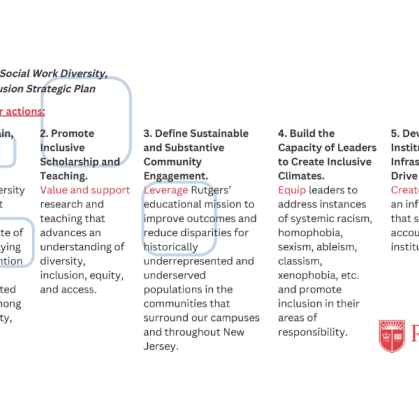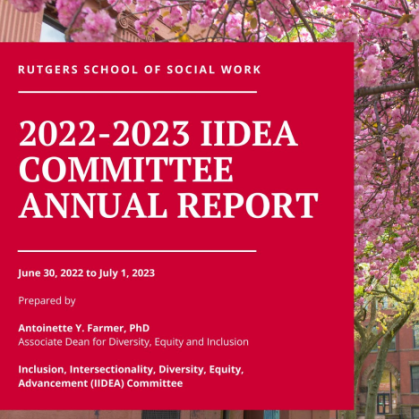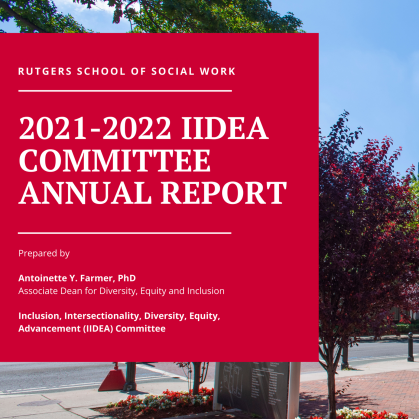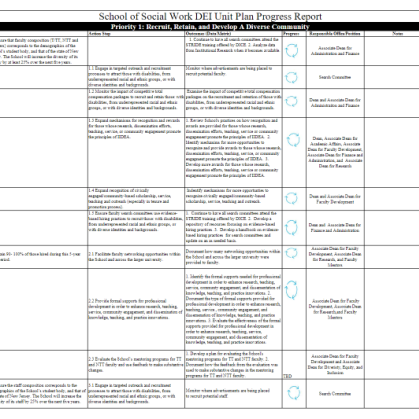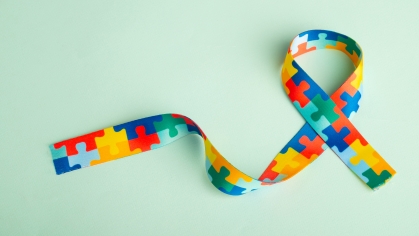
Diversity, Equity & Inclusion
Inclusion, Intersectionality, Diversity, Equity and Advancement (IIDEA)
The School of Social Work’s initiative for Inclusion, Intersectionality, Diversity, Equity and Advancement (IIDEA), along with the IIDEA Committee, was established in fall 2020 as part of the School’s strategic plan, Toward a More Just Future. This committee advances inclusion, intersectionality, diversity, equity, and advancement efforts within the school and the larger social work community, and partners with the university’s Division of Diversity, Inclusion, and Community Engagement on universitywide diversity, equity, and inclusion initiatives.
The IIDEA committee encourages you to explore and interact with the information below. Read shared definitions and the principles of IIDEA, meet and follow the work of the committee and the School’s diverse community, and engage with various organizations and resources to further the efforts of inclusion, intersectionality, diversity, equity, and advancement at the School of Social Work.

Five Pillars of DEI Strategic Plan
Click the graphic to learn more
Statement on Inclusion, Intersectionality, Diversity, Equity and Advancement
Rutgers School of Social Work embraces inclusion, intersectionality, diversity, equity, and advancement (IIDEA) as core principles for our curriculum, our community engagement, our research portfolios and our faculty, student, and staff community. The IIDEA Committee, in partnership with the Office of Academic Affairs and the Curriculum and Executive Committees, present a contextual/conceptual/theoretical framework that undergirds the School’s initiatives that further IIDEA.


Liberatory Consciousness at the School of Social Work
In May 2020, School of Social Work faculty voted to adopt Dr. Barbara Love's liberatory consciousness framework (LCF; Love 2010), which addresses antiracism and oppression, to further IIDEA for social justice at the School, and for agencies that partner with the School, in order to carry out the School of Social Work's core mission. In Fall 2022, the LCF began to be used to guide curriculum development, students' work in their practicums, and the work of staff within the School.
Defining IIDEA
The IIDEA Definitions and Statement Subcommittee was charged with defining the terms used in the acronym IIDEA and other terms that are frequently used in social work. We realize that the meanings of these terms are fluid and the way we understand them changes over time. Identities or social locations are not ranked or listed in any particular order of importance.
Inclusion
Inclusion refers to a characteristic of environments in which individuals and groups feel welcomed, respected, valued, and supported through the elimination of practices and behaviors that result in marginalization. An inclusive climate embraces difference and offers respect in words and actions, so that all people can fully participate in the University’s opportunities.
Source: adapted from Rutgers’ Universitywide Diversity Strategic Plan
Intersectionality
Intersectionality refers to the acknowledgement of the interconnected nature of social categorizations such as race, ethnicity, gender identity, age, religion, language, ability status, sexual orientation, and socioeconomic status as they apply to a given individual or group, and how systems of oppression overlap to create distinct experiences of stigma, discrimination, and marginalization for people with multiple identities.
Source: adapted from Kimberlé Crenshaw’s On Intersectionality: Essential Writings
Diversity
Diversity refers to the presence and respect for the variety of personal experiences, values, and worldviews that arise from differences of culture and circumstance. Such differences include but are not limited to race, ethnicity, gender identity, age, religion, language, ability status, sexual orientation, and socioeconomic status.
Source: adapted from Rutgers’ University-wide Diversity Strategic Plan
Equity
Equity refers to the identification and elimination of barriers that prevent full participation of students, faculty, and staff in every stage of education and career development. Attention to equity involves ensuring access, opportunity, and advancement for all students, faculty, and staff in every stage of education and career development and redressing the exclusion of historically underrepresented and underserved groups in higher education.
Source: adapted from Rutgers’ Universitywide Diversity Strategic Plan
Advancement
Advancement refers to the act of ensuring a society in which all individuals have equal rights without discrimination based on race
Anti-racist
An anti-racist is “one who is supporting an antiracist policy through their actions or expressing an antiracist idea.” (Kendi, 2019, p.14)
Citation: Kendi, I. X. (2019). How to Be an Antiracist. One world.
Anti-racism
Anti-racism is “a powerful collection of antiracist policies that lead to racial equity and are substantiated by antiracist ideas.” (Kendi, 2019, p.21)
Citation: Kendi, I. X. (2019). How to Be an Antiracist. One world.
Anti-racist Social Work
Dominelli (2017), a British author, explains that “anti-racist social work is a form of practice that takes as its starting point racialised social relations that depict ‘black’ people as inferior. It aims to eradicate racist social relations and dynamics from the profession and society. In realising this, white people are encouraged to tackle racist practices at the personal and collective levels in organisations and institutions; learn about black perspectives; and build alliances with black people by agreeing common objectives to eradicate racism and create egalitarian partnerships. Black people have their own expectations and demands for these alliances and engage with white people to achieve mutually acceptable ways forward (Bishop, 2002). These also address other forms of oppression that intersect with racist social relations, e.g., sexism, classism. Focusing on racism alone is but a starting point for the anti-oppressive anti-racist journey” (p. 10).
Citation: Dominelli, L. (2017). Anti-Racist Social Work. Macmillan International Higher Education.

IIDEA Values & Principles
Pronouns
Rutgers School of Social Work's IIDEA Committee recognizes the importance and use of personal pronouns. For more information on what personal pronouns are and why they matter, please view this resource from mypronouns.org.
Inclusive Style Guides
DC Fiscal Policy Institute Style Guide for Inclusive Language provides guidelines and resources for ways to employ inclusive language and integrate a racial equity lens in writing. The Centers for Disease Control's (CDC) Health Equity Style Guide aims to frame information from a health equity lens when communicating about health disparities and general public health implications.
The American Medical Association (AMA) shares an article on reporting race and ethnicity in medical and science journals.
Rutgers Beloved Community
Rutgers Office of Diversity, Equity, and Inclusion defines a "beloved community" as a commitment to work together to embody, reflect, and respect the complexities of all our parts.
As part of this work, the University has launched the Picturing a Beloved Community Poster Series, which defines the University's core values and aspirations, outlining how we aim to interact with these values as ideals and action-oriented goals:
- Work towards INCLUSION and Respect DIFFERENCE
- Provide OPPORTUNITY and ensure ACCESS
- Value INNOVATION and promote LEADERSHIP
- Foster GLOBAL REACH and honor HUMANITY
For more information on the University Beloved Community and to download artwork from the poster series, click here.



IIDEA Committee
The purpose of Rutgers School of Social Work's Committee for Inclusion, Intersectionality, Diversity, Equity and Advancement (IIDEA) is to advance the School's initiatives that further inclusion, intersectionality, diversity, equity, and advancement.
Based on the School of Social Work's strategic plan, the IIDEA Committee was established in fall 2020. Dean Cathryn C. Potter charged the committee with the following:
-
In partnership with the Office of Academic Affairs, advance a conceptual/theoretical framework that undergirds the initiatives that further inclusion, intersectionality, diversity, equity, and advancement (IIDEA) for social justice for the school, and for agencies that partner with the school, in order to carry out the core mission of SSW.
-
In partnership with multiple SSW entities, including the curriculum faculty, and the staff council, to lead development and implementation oversight of a comprehensive, evolving, multi-year plan that advances IIDEA within the school, and agencies that partner with the school.
-
Identifying areas where inclusion, intersectionality, diversity, equity, and advancement need to be addressed and make recommendations to the Dean, administration, and faculty to address the identified areas.
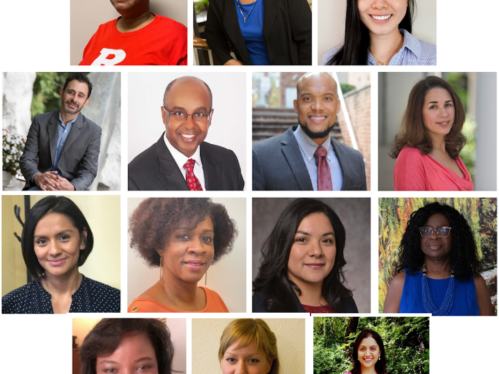
IIDEA Committee Members
Meet the Current IIDEA Committee
IIDEA Reports
Learn about the IIDEA-related work happening at the School of Social Work by reviewing our recent annual report and progress report.
IIDEA News
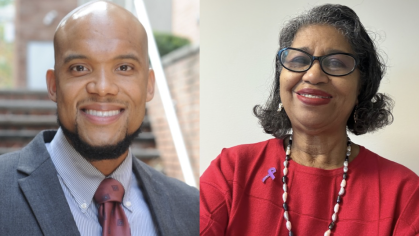
March is Social Work Month. Thomas Benjamin, Senior Program Coordinator at the Rutgers School of Social Work's Center for Research on Ending Violence speaks with Dr. Sandra Edmonds Crewe, Sojourner Truth Social & Racial Justice Visiting Professor at Rutgers School of Social Work. Dr. Edmonds Crewe discusses this year's Social Work Month theme, Compassion + Action, and the work she is accomplishing at Rutgers.

